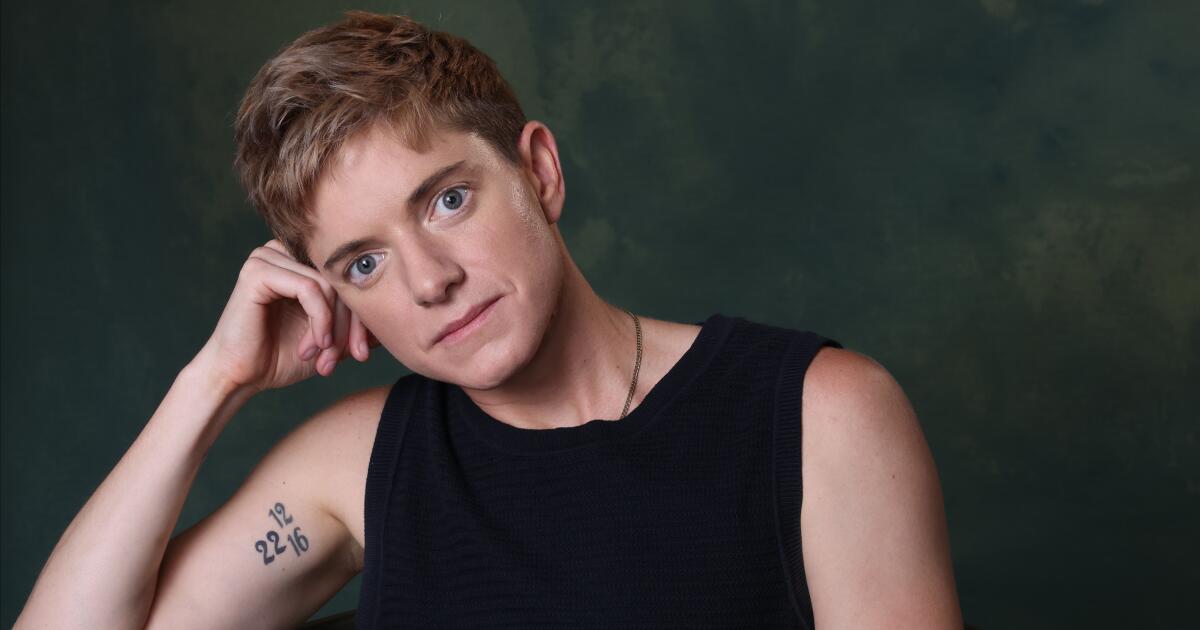
There is something of the fae folk about Mae Martin, at least onscreen — the big blue eyes, the short blond fluff of hair, the nonbinary grace. Over the last decade, Martin has darted through the forest of popular culture like a modern-day Peter Pan, if Peter had been less afraid of growing up and more concerned with what that actually means.
In their quest to figure it out, Martin has created their own, more inclusive Neverland, hunting metaphoric pirates via stand-up (her 2023 Netflix special “Sap” literally opens in the forest), a podcast (“Handsome” with Tig Notaro and Fortune Feimster), books (the 2019 YA “Can Everyone Please Calm Down?: A Guide to 21st Century Sexuality”) and television series (including and especially the marvelous 2020 semi-autobiographical “Feel Good”).
Earlier this year, Martin, who is from Toronto, spent a dozen years in London before moving to L.A., pulled another hyphenate out of their hat by releasing an indie rock album. And now they are returning into the forest (literally) to save Wendy and the Lost Boys (almost literally) in the new Netflix drama “Wayward,” now streaming.
The limited series premiered at this year’s Toronto Film Festival, which, Martin said over a breakfast burrito in Silver Lake, “felt like my wedding. I mean, my family was there and friends from my teens and was very special, but it was also nerve-racking, with clothes and costumes crises and so much pressure to be the happiest day.”
In “Wayward,” which Martin wrote and stars in, all roads lead to Tall Pines, an “academy” for troubled teens and the seemingly idyllic Canadian community in which it is located. The lives of teen besties Abbie (Sydney Topliffe) and Leila (Alyvia Alyn Lind) are wrenched apart when Abbie is sent to Tall Pines, the academy, with Leila determined to rescue her. Meanwhile, Officer Alex Dempsey (Martin), formerly of Detroit, has moved to Tall Pines, the town, with his pregnant wife, Laura (Sarah Gadon), their landing seemingly softened by academy head Evelyn Wade (Toni Collette).
Alex is trans, but that is treated as less of an issue than the fact that he previously worked in Detroit and views the small town with uneasy suspicion. The latter proves entirely justified as events unfold.
For all its violence and dark twists and turns, there is a fairy-tale-like quality to “Wayward.” Martin wrote it, they said, to explore the underbelly of the “troubled teen” industry, particularly the camps that became popular in the 1990s, but in a way that is almost as semi-autobiographical as “Feel Good.”
A self-described wayward teen themself, they had their own friend taken away and shipped off to a version of Tall Pines.
“My best friend Nicole, we were so close and still are, she was a stoner,” Martin said. “I don’t think [she was] in any need of radical intervention, and she was away for two years. She escaped, hitchhiking, and she came back with these really shocking stories about this place, which has since been shut down.
“I always felt guilty,” Martin added. “I was probably in need of a radical intervention and this show is about ‘What if I had gone to get her and we had been there together?’”
The series is very much a heightened thriller, Martin said, but with a very clear message. “I was in rehab, a good rehab,” they said, “and I feel strongly about how casually and quickly we pathologize teenagers and ascribe these labels to them. Teenagers have a keen sense of injustice and then we gaslight them.
“It’s not like we are exposing any particular institution,” they added. “I just want people to think about it.”
Which is what their own character does. After an encounter with a teen who has run away from the academy, Alex begins to question the institution’s methods, which leads him to Abbie and Leila, who he attempts to help.
Martin has said in the past that they had always wanted to play a leading man, but said, “you have to put that out of your mind so you don’t write a very suave sexy character who’s always in control.”
Instead, they said, Alex is flawed but “deeply earnest, as I am. I thought about John C. Reilly’s character in ‘Magnolia’ and characters I love in ‘Fargo’ and agent Dale Cooper [from ‘Twin Peaks’]. I hope that people fall in love with him and then are shocked by his fallibility.”
The fact that Alex is transgender (Martin identifies a nonbinary) is in no way the point of the story, or even of the character. “It’s important to see queer characters where it’s not the defining aspect,” Martin said. “That’s probably reflective of a lot of trans people’s lives … that their identity isn’t a big part of their day to day.”
It worked out well, they said, because “part of what is so seductive about Tall Pines is that it is very progressive. In researching the troubled teen industry, the roots come from these self-help cults in the ’70s where all the central tenets were about equality and personal freedom. But it’s so pernicious …”
Cults, Martin said, “are always a useful metaphor for how complicit we are, what we’re willing to compromise in order to have a comfortable life. That heteronormative nuclear family is so compelling for [Alex].”
Unlike 2020’s “Feel Good,” which Martin fears was put into a niche category because it was so specific and personal, “Wayward” is a way for them to create a big genre show — dark thriller — through a queer lens so “a larger, broader audience can connect with it.”
Though they loved playing a “he/him,” Martin, who still regularly does stand-up at Largo and other L.A. venues, found Alex quite challenging. They had to train with a gun, for example, and, more important, let go of the need for punch line. “The temptation is to make the crew laugh,” they said. “There’s a whole silent audience and when they’re not laughing, you feel like you’re bombing.”
In the beginning, they said, “there was a little more Mr. Bean energy about it, which we fixed in the editing. I fell in love with acting in this role. I have impostor syndrome about that and to work with Sarah and Toni, it gave me permission to be an actor.”
Filming took Martin back to her hometown, Toronto, which led to some startling reunions. Martin once babysat for one of the supporting cast members and during editing, realized that not only had they gone to summer camp with the sound designer Brennan Mercer but that Mercer had gathered some of “Wayward’s” sound effects from that camp’s buildings. “So all the creaking door of Alex’s house is from the dining hall at my old camp,” Martin said.
The final minutes of “Wayward” appear to leave open the possibility of a second season. Martin is not opposed, but they don’t necessarily see the need. “By the end, it escalates, becomes a parable, there’s a mythic quality. I’ve been nervous that people will go into [it] expecting a procedural crime thriller,” they said.
As Martin muses about what, say, “‘Prime Suspect’ would look like with Martin the lead” — ”I’m 38, I can play a cop” — they laugh. “I did like seeing myself drive in [“Wayward’] though,” they said. “I don’t drive.”
But then neither did Peter Pan.



